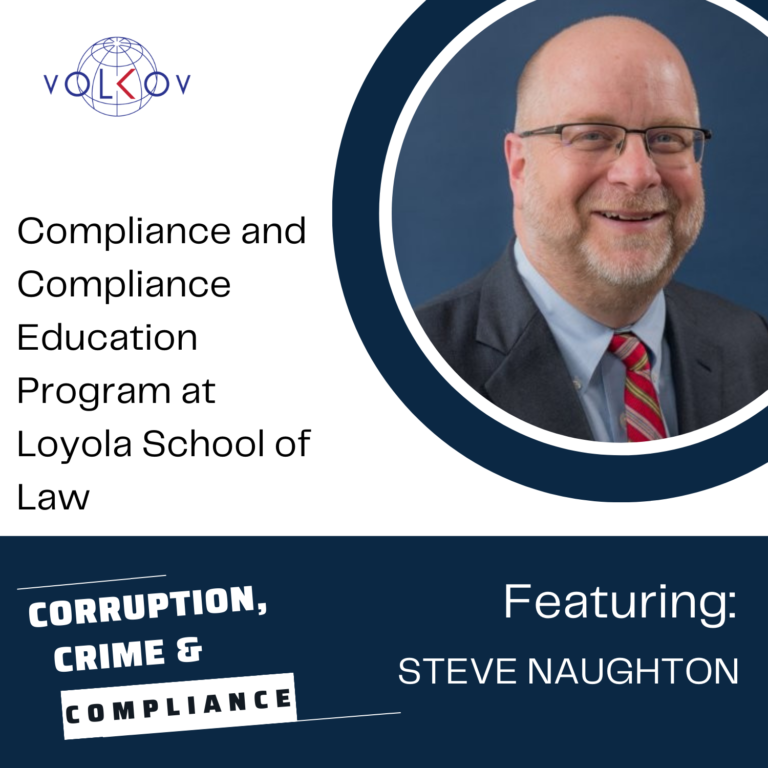How can we build a culture that motivates people to do the right thing? In this episode of Corruption, Crime and Compliance, Michael Volkov and guest Steve Naughton, explore crucial questions about fostering ethical cultures within companies and practical steps compliance leaders can take to transform performance. Steve shares insights from his journey, detailing the evolution of compliance leadership roles and offering a glimpse into PepsiCo’s growth in this area during his tenure as Chief Compliance Officer. For those considering careers in compliance, he emphasizes that expertise in this field can be developed without a law degree.
Steve Naughton currently oversees Compliance and Enterprise Risk Management programs at Loyola University Law School. He previously served as Pepsi’s Chief Compliance Officer, guiding the growth of their compliance program over 8 years. He is passionate about making sure compliance functions can work independently.
You’ll hear Michael and Steve discuss:
- Steve began his career at major law firms before going in-house to manage litigation and M&A deals during pivotal moments at Quaker Oats and Snapple.
- PepsiCo’s iconic GC Larry Thompson asked Steve to build a new compliance program starting with just 3 people. Over 8 years, Steve grew Pepsi’s program from 3 to over 40 employees with global reach.
- Larry saw compliance as preventative and empowered Steve with independent reporting to the Board. Steve remarks, “[Larry] viewed [compliance] as much more preventative than reactionary … his take on compliance has always been, to the extent that we can prevent something or to the extent that as soon as we detect it, we’ll go in and check it out instead of waiting till everything was fully investigated.”
- Pepsi has been on the World’s Most Ethical Companies list for 15 years in a row, showcasing its success in following ethical practices.
- Pepsi has never faced serious enforcement actions, and this is attributed to turning ethical practices into a value-add for the business.
- Not every company has the resources or leadership seen at Pepsi, making it challenging to bring others along in the compliance profession.
- Steve emphasizes the importance of a risk-based approach in compliance and recommends developing a strategic five-year plan to address top risks progressively.
- He encourages companies to be disciplined and follow a plan, citing the Department of Justice’s emphasis on showing work prospectively, not retroactively, to defend actions and maintain a strategic plan.
- Michael and Steve discuss the challenges of implementing change in compliance programs, emphasizing the importance of building a team and garnering support from other functions.They recommend a realistic 3 to 5 year timeframe for implementing changes.
- Cultures where people feel safe speaking up are foundational to compliance. This can aid in preventing and addressing ethical lapses and compliance challenges.
- Steve cites examples from Wells Fargo, Volkswagen, General Motors, and Boeing. In these organizations, where you would expect people to be skilled and ethical, employees often didn’t speak up. This was because they thought their concerns wouldn’t be listened to, or the culture didn’t encourage open communication.
- Compliance is not just about following rules; it’s about changing the culture in companies. We need to think differently and work towards making a culture where doing the right thing is not just accepted but encouraged.
- Steve runs a highly respected compliance curriculum at Loyola University which has prepared many future Chief Compliance Officers. However, compliance expertise doesn’t strictly require legal training.
KEY QUOTES
“ I think where he [Larry Thompson] was a visionary on compliance was the entire idea, two of them really. The first of which was that he viewed it as much more of an independent function. …And then the second thing is that I think he really looked at it as, ‘Okay, how do we go out and make sure that we’re taking these steps to prevent the problems that you might see otherwise?’ ” – Steve Naughton
“…the Department of Justice has said in no uncertain terms between the Monaco memo and otherwise, show your work. You can’t be doing it retroactively. Show your work prospectively. Show us what you’re thinking as you’re going along, not only to defend what you’re doing but also to have a plan that you work against.” – Steve Naughton
“You have to have a plan in place, but you also have to have as a parallel track this idea, let’s make sure that we’ve got the right culture and we’re trying to build the right culture.” – Steve Naughton
Resources:
Steve Naughton on LinkedIn | Loyola School of Law | Email






